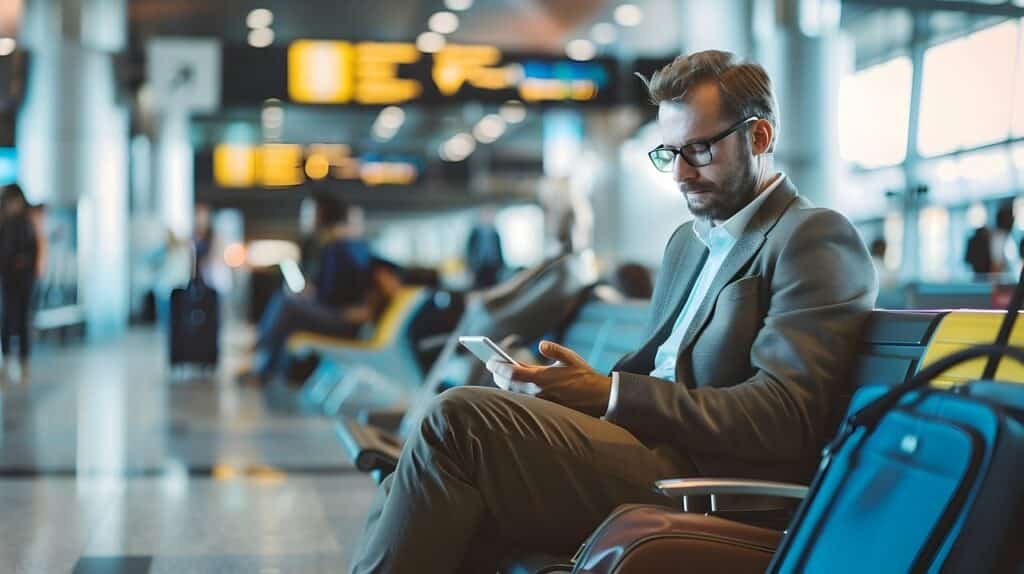Stay safe and secure: cyber tips for when you’re on the move
5th June 2024 | Modified: 30th May 2024Categories: Security
“Remember any device that transmits data can be stolen and used fraudulently”
So, you’ve been going through your checklist before you fly off on your business trip: encrypt or delete sensitive files? CHECK. Tamper seals over the hard drive access points? CHECK. Spare USB port locks? CHECK, privacy screen? CHECK. Was it always like this? Surely not! Remember how you used to be able to just throw your laptop into your travel case and off you went? Not anymore.

Laptops and smartphones are a gateway into any business, if you know how to get into them, hence why they are such a target for cybercriminals. There are a range of statistics to choose from; mobile phones are still the most commonly stolen device in the UK. On average, 1 in 10 laptops gets stolen every year, or one every 53 seconds.
Bars, restaurants, your car, airports, at the office, public areas, the gym, hotels, public transport, coffee bars, even when you’re in the library. These are some of the most common places for laptop and mobile theft. So how do you protect your devices when you’re on the go?
Logging on and closing down
Haven’t we all thought to just put our laptop “to sleep”, we’ll work on our laptop whilst we’re in the café, in the park, etc. So yes, it’s tempting just to close the lid and not worry too much about it. The problem is that thieves know this about laptops. So, it’s best practice to just power down completely, so if they do steal it, they can do nothing with it.
Make sure you have two-factor authentication in place, yes it takes an additional 10 seconds to perform the act. But, it’s a super secure way of making sure you don’t let thieves in. Also, make sure your password is something password-worthy, it’s just plain good practice to use a strong password, whether you’re at home or abroad.
Also, powering down is good for your laptop, as whilst it’s in sleep mode, it generates heat, using power, and if inside a case, or cover, it can get fairly hot in there. So to ensure complete laptop safety, power down and lock it up.

Charging on the go
The variety of default voltages across the world is huge. So, look into buying a high-quality branded power plug converter. Buying cheap could have you paying dearly. Whilst most modern laptops have some form of surge protection, it might not be enough for a major spike in power. So, it’s important to protect your laptop or mobile phone from any form of variable flow of electricity hitting it.
There are numerous high-quality spike protectors that you can just plug into the wall and then into your device to save you from frying your circuits. They come in joules ratings, so something with a rating between 1000 to 2000 joules would be a start.
Take proactive steps to secure all your devices; be vigilant at all times"
Securing your laptop
The actual physical security of your laptop should be high on your priority list as well. Cafes, airports, and libraries are notorious shopping grounds for thieves to steal your piece of kit.
It may be worth buying a Kensington Lock for your laptop. You basically insert it into your laptop and then wrap it around a secure immovable object near where you are. Just seeing it, will hopefully discourage most grab-and-run thefts.
Public Wi-Fi
It’s often free, and when you’re abroad, data roaming charges can be daunting. So, when you’re offered free airport wi-fi, it can be hard to turn down such a honeypot offer.
But beware cyber criminals will often set up a free Wi-Fi point waiting for the unknowing, who in the belief that it’s the café, or airport that they are connecting to, will rename the Wi-Fi point to a name that looks just like the place you’re in, and as you log in, they break in and steal all your details etc, and worse still install a malware programme that you then inadvertently install onto your company’s network. Unbelievable but it’s true.
Make it common practice to switch off the auto joining settings on your laptop, or better still use your company’s VPN to access your company data. Unless the cyber hackers have the password, they won’t be able to monitor your encrypted VPN data.

Don’t use public equipment like an internet café or coffee shop to do your business work on"
Some top tips when you travel
- Don’t use public Wi-Fi
- If you do log into a public Wi-Fi, try using the wrong password. If the network allows you on, then it’s probably a scam network
- Switch off your laptop and mobile phone auto-connect features
- Tether your laptop to your mobile phone
- Check-in with your IT manager that all your network patching is up to date
- Use your company’s VPN to secure your business data
Conclusion
It’s a sad thing that you can’t just do business and enjoy travel. You have to be 100% hypervigilant in knowing that someone, somewhere will be trying to gain access to your electronic device, to compromise your access to your data. You could inadvertently be putting yourself and your company in danger when you are in vulnerable locations.
If you do feel that your computer has been compromised, call your IT manager immediately along with your bank, to prevent any unauthorised transactions from a secure line, and let them know what has happened.

